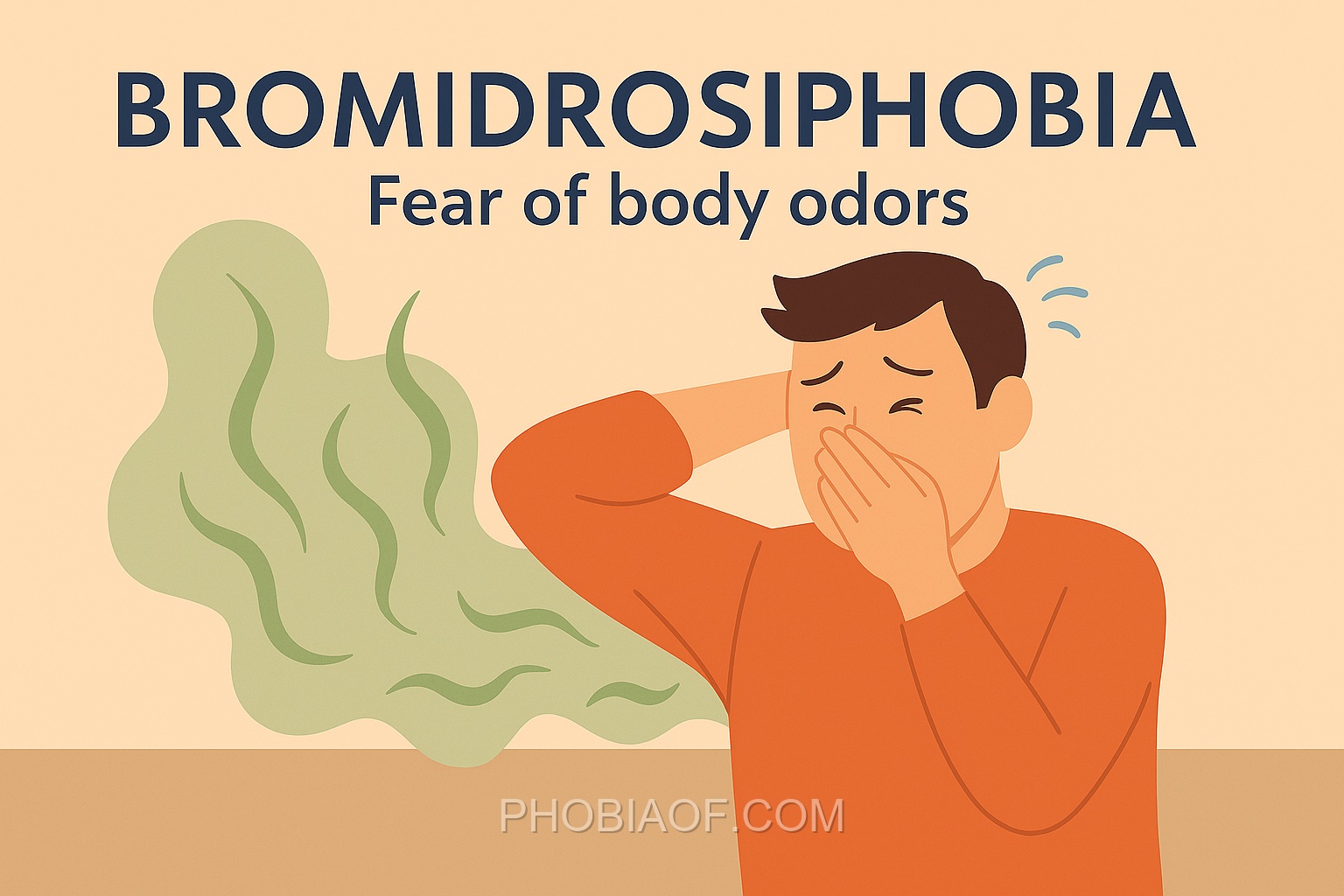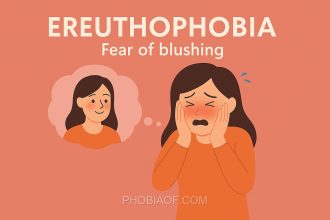Have you ever felt anxious about smelling unpleasant or worried that others might notice an odor from your body? For some, this concern goes beyond the occasional moment of self-consciousness and becomes a persistent fear known as Bromidrosiphobia.
Bromidrosiphobia is the intense fear of body odors. The word itself comes from Greek roots: “bromos” meaning stench, “hidros” meaning sweat, and “phobia” meaning fear. This phobia can affect individuals in various ways, impacting their daily lives and interactions with others.
For those experiencing Bromidrosiphobia, the fear is not merely a concern about personal hygiene. It can lead to serious anxiety and avoidance behaviors, such as:
- Excessive use of deodorants and perfumes.
- Avoiding social gatherings or close interactions.
- Frequent washing and changing of clothes.
- Constantly seeking reassurance from others about personal odor.
Living with Bromidrosiphobia can be challenging, as it often creates a cycle of anxiety and self-consciousness. However, understanding and addressing these fears can lead to more fulfilling social interactions and improved personal well-being.
Causes of Bromidrosiphobia
Bromidrosiphobia, the fear of body odors, can arise from a variety of factors. Understanding these causes can help in addressing and managing this phobia effectively. Below are some common reasons why someone might develop bromidrosiphobia.
- Genetic Predisposition:
Some individuals may have a genetic tendency to develop anxiety disorders, including specific phobias like bromidrosiphobia. If there is a family history of phobias or anxiety, a person might be more likely to experience similar fears.
- Traumatic Experiences:
A past traumatic event related to body odors, such as a humiliating experience or bullying, can trigger bromidrosiphobia. The memory of the event may lead to an intense fear of encountering similar situations.
- Learned Behavior:
Observing and mimicking the reactions of others with strong aversions to body odors can contribute to the development of this phobia. If a child sees a parent or sibling reacting fearfully or disgusted, they may adopt these behaviors.
- Psychological Factors:
Individuals with a predisposition to anxiety and perfectionism might be more susceptible to developing bromidrosiphobia. The fear of being judged or rejected due to body odor can heighten anxiety and contribute to the phobia.
- Environmental Factors:
Societal and cultural influences can play a significant role. In societies where personal hygiene is heavily emphasized, there may be an increased fear of body odors, leading to bromidrosiphobia.
Research in this area suggests that the combination of these factors can vary greatly from person to person. Understanding the underlying causes is crucial for developing effective treatment strategies, such as cognitive-behavioral therapy or gradual exposure therapy, to help individuals manage their fears and improve their quality of life.
Symptoms of Bromidrosiphobia
Bromidrosiphobia, the intense fear of body odors, can significantly impact a person’s life. Those experiencing this phobia often feel an overwhelming sense of fear or anxiety, especially when they anticipate or encounter situations involving body odors. Recognizing these symptoms can be the first step towards seeking help and understanding the impact of this phobia. Here are some common symptoms:
Physical Symptoms:
- Panic attacks characterized by a sudden surge of fear, accompanied by physical symptoms like trembling or shaking.
- Excessive sweating, even in cool environments, which may exacerbate the fear of body odors.
- Rapid heartbeat, often accompanied by a sense of impending doom.
- Shortness of breath or hyperventilation when thinking about or exposed to body odors.
- Dizziness or lightheadedness, which can occur during moments of intense fear.
Emotional and Behavioral Symptoms:
- Avoidance of places or situations where body odors might be present, such as crowded public spaces or social gatherings.
- Overwhelming dread and preoccupation with personal hygiene, often leading to compulsive behaviors.
- Feelings of embarrassment or shame, stemming from the fear of emitting body odors.
- Heightened vigilance, always on the lookout for potential odor-related triggers.
- Difficulty concentrating or persistent anxiety that disrupts daily activities.
If severe, these symptoms can interfere with daily life, affecting personal relationships, work performance, and overall well-being.
Treatment for Fear of Body Odors
Overcoming bromidrosiphobia, or the fear of body odors, is entirely possible with the right approach and support. This phobia can be treated and managed over time, allowing individuals to live a more comfortable and confident life. Below, we explore various treatment options and coping strategies that can help.
Proven Therapies
- Exposure Therapy: Gradually facing your fear in a controlled and safe environment can desensitize your response over time. A therapist might guide you through exposure exercises that start with less intimidating scenarios and progressively work up to more challenging situations. This method helps reduce anxiety by breaking the association between body odors and fear.
- Cognitive-Behavioral Therapy (CBT): This approach focuses on changing the fearful thoughts and beliefs that contribute to bromidrosiphobia. By working with a therapist, you can learn to challenge and reframe negative thoughts, ultimately reducing anxiety and fear.
- Counseling: Speaking with a mental health professional can provide a supportive space to explore your fears and develop coping strategies. Counseling can also help address any underlying issues contributing to the phobia.
Self-Help Coping Techniques
- Relaxation Exercises: Techniques such as deep breathing, progressive muscle relaxation, and visualization can help manage anxiety symptoms when they arise.
- Meditation: Regular practice of mindfulness meditation can increase your awareness of your thoughts and feelings, allowing you to respond to fear with greater calm and clarity.
- Support Groups: Connecting with others who experience similar fears can provide encouragement and insights. Sharing experiences and coping strategies can be incredibly beneficial.
Medication
In severe cases, medication such as anti-anxiety drugs may be considered to help manage symptoms. However, therapy and coping skills are typically the focus of treatment for lasting change.
If bromidrosiphobia is interfering with your daily life, I encourage you to seek professional help. With the right support and strategies, overcoming this phobia is within reach. Remember, you are not alone, and help is available.
Conclusion
Understanding the causes and symptoms of bromidrosiphobia, the fear of body odors, is a crucial step in empowering yourself or a loved one to address this phobia. By recognizing the underlying factors that contribute to this fear, individuals can take meaningful steps towards managing their anxiety and improving their quality of life. With knowledge, comes the power to challenge and overcome the limitations imposed by this phobia.
It’s important to remember that many people have successfully managed or even conquered their phobias with time and the right support. If bromidrosiphobia is impacting your daily life, seeking the assistance of a mental health professional or discussing your concerns with a doctor can be a valuable step forward. Therapy and professional guidance offer effective strategies to confront and reduce the fear associated with body odors.
Take heart in knowing that you are not alone in this journey. With patience, persistence, and proper help, overcoming or managing the fear of body odors is entirely possible. Embrace the opportunity to live more freely and confidently by taking the first step towards support and understanding. Your path to a brighter, more fearless future is within reach.






